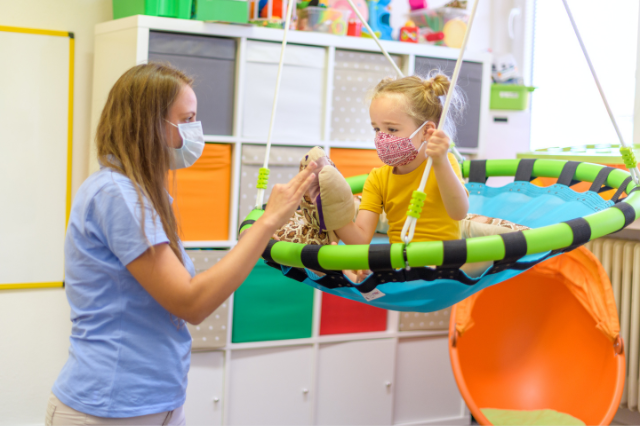When does a child need occupational therapy?
Paige Flamm
If you’ve questioned, “When does a child need occupational therapy?” in regards to your own child and their development, this post aims to look at all the ways occupational therapist provide services for children so you can determine if this is something that could support your child.
When Does A Child Need Occupational Therapy?
Are you wondering when you should seek occupational therapy for your child? If so, you’re not alone. Many parents find themselves in the same situation and are unsure of when to reach out for help. The answer is not always straightforward, as each child and situation is unique. However, there are certain signs that may indicate your child could benefit from occupational therapy.
What is Occupational Therapy?
First, it’s important to understand what occupational therapy is. Occupational therapy is a form of therapeutic intervention that helps children develop and strengthen skills that are essential for daily life. This includes both physical and cognitive skills, such as fine motor control, sensory processing, and problem-solving. An occupational therapist can also work on behavior and communication skills.
Occupational Therapist Help with Fine and Gross Motor Skills:
When it comes to deciding if your child could benefit from occupational therapy, there are certain signs that may indicate it’s time to seek help. If your child is having difficulty with basic self-care activities such as getting dressed, eating, or brushing their teeth, occupational therapy could be beneficial. Occupational therapy can also help children who have trouble with their gross motor skills, including running, jumping, and throwing a ball. Additionally, if your child is having difficulty with tasks that require fine motor control, such as writing or using scissors, occupational therapy could be beneficial.
How Do Occupational Therapists Help with Social Skills?:
In addition to physical skills, occupational therapy can help children with social skills. If your child has difficulty making friends, playing with other children, or communicating their needs, an occupational therapist can help them develop these skills. They can also help children develop problem-solving skills and learn strategies to cope with their emotions.
Social skills involve the ability to communicate effectively, build relationships, and navigate interpersonal situations. These skills are essential for success in life, as they allow us to interact with others and build meaningful connections.
Occupational therapists use a range of techniques to help individuals develop their social skills. They can provide activities and role-playing exercises to help individuals practice applying these skills in real-world situations.
In addition to providing direct instruction, occupational therapists can also educate individuals about the importance of healthy habits that support social development. This could include teaching about the importance of getting enough sleep and physical activity, eating a balanced diet, and managing stress.
How Do Occupational Therapists Help with Emotional Regulation?:
One of the many areas in which OTs can provide assistance is with emotional regulation. Emotional regulation refers to the ability to effectively manage one’s own emotions, as well as the emotions of others.
OTs can help individuals learn to identify their emotions and develop strategies to better manage them. First, OTs can help individuals become more aware of their emotions by teaching them to recognize and name their feelings. Once an individual is aware of their emotions, OTs can then help them develop strategies such as deep breathing, mindfulness, and relaxation techniques to help them better manage their emotions. OTs may also help individuals develop coping skills to manage stress and anxiety.
OTs may also provide individuals with guidance on how to better regulate their emotions in response to specific situations. For example, OTs can help individuals learn how to take breaks or reduce exposure to negative stimuli when feeling overwhelmed, or how to use assertive communication when feeling frustrated or angry. OTs may also work with individuals to identify triggers for their emotions and develop strategies to better cope with them.
If you’re concerned that your child may need occupational therapy, reach out to us for a free consultation.Remember, every child is unique and has different needs. While there are certain signs that may indicate occupational therapy is beneficial, the decision to seek help should be made on an individual basis. If you’re still unsure, we're here to help!




